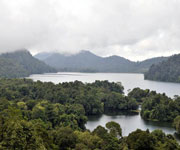Is World Heritage Western Ghats in danger?
The inclusion of parts of India's Western Ghats in the United Nation's Education, Scientific and Cultural Organisation (UNESCO) World Natural Heritage List in early July has highlighted the abiding concerns of the global community to conserve what is aptly deemed to be the lingering vestige of all substantive ecosystems in the sub-continent. Even as the mountain range here runs parallel to the country's west coast straddling six States of Gujarat, Maharashtra, Goa, Karnataka, Tamil Nadu and Kerala, the 39 sites selected by UNESCO to protect effectively their brittle conservation status with due global monitoring cover only an area of some 8,000 km. This is roughly five per cent of the 140,000 sq km of the Ghats. This is not surprising, considering the fact that the Western Ghats were once covered in dense forests but down the ages, a large part of the range was logged or converted into agricultural land for commercial crops such as tea, coffee, rubber and oil palm or cleared for livestock grazing, reservoirs and roads.
Legal and Illegal Activities Western Ghats Area

The mushrooming populations around protected areas and other forests had also played its role in habitat destruction, increased fragmentation; wildlife poaching and human-wildlife wrangles. Over the years, the local governments in the Western Ghats zone 'excluded' mine pits from the environmental remit, letting mining to flourish in enclosures and emasculating conservation laws. Alongside, large number of dam constructions, eco-tourism and real estate development worsened the implicit purity of the veritable biological hotspot the Western Ghats were once famous for.
Despite the Centre's, Supreme Court's and even international best intention institutions such as UNESCO's efforts to conserve the Ghats, they are still no match to local politicians and aspiring project owners. The latter categories of stakeholders do not get elated by the UNESCO's new-fangled status to the Western Ghats with both the governments of Karnataka and Kerala being averse to institute any additional safeguards for the mountain range. The reason is understandable as they do not like any further ban on future mining and other tourist projects or rules being tightened and closely monitored by both the Centre or any other external agency that might ramp up support as a purely conservationist gesture.

Browse All UNESCO World Heritage Sites in India.
It was only at the behest of the apex court that the seventh dam construction across the Kalinadi River that courses through verdant jungles in the Ghats was halted. Again, the Supreme Court called a halt to iron ore mining in Kudremukh in 2000 in favour of safeguarding the brittle ecosystem housed in the largest valley in Asia. The Centre, too, in order to ensure protection of biodiversity of the Western Ghats, had slapped some restrictions for setting up industries in certain ecologically sensitive areas that include a moratorium up to end-December 2012 for taking up projects from Sindhudurg and Ratnagiri areas of Maharashtra and for consideration of mining projects in Goa. There is also a ban on consideration of mining projects in some districts of Karnataka in compliance with the apex court directives in the last couple of years.
Conservationists and civil society representatives rail against this perverse approach of the State governments to development which is being done at the cost of maintaining a salubrious milieu for the overall weal of all stakeholders not only within the country but also in surrounding countries.
A redeeming feature is that the Ministry of Environment & Forests said on August 17 that it has set up a high level working group to study the preservation of the ecology, environmental integrity and holistic development of the Western Ghats in view of "their rich and unique biodiversity". This Committee headed by Planning Commission Member (Science) Dr. K. Kasturirangan with environmentalists as members would hopefully outline the roadmap for preservation of at least the small areas in the vast Western Ghats as identified heritage sites by UNESCO from being obliterated by crass commercial considerations.
The inclusion of parts of India's Western Ghats in the World Natural Heritage List in early July has highlighted the abiding concerns of the global community to conserve what is aptly
Browse All UNESCO World Heritage Sites in United States Of America. The original Source File!!!


